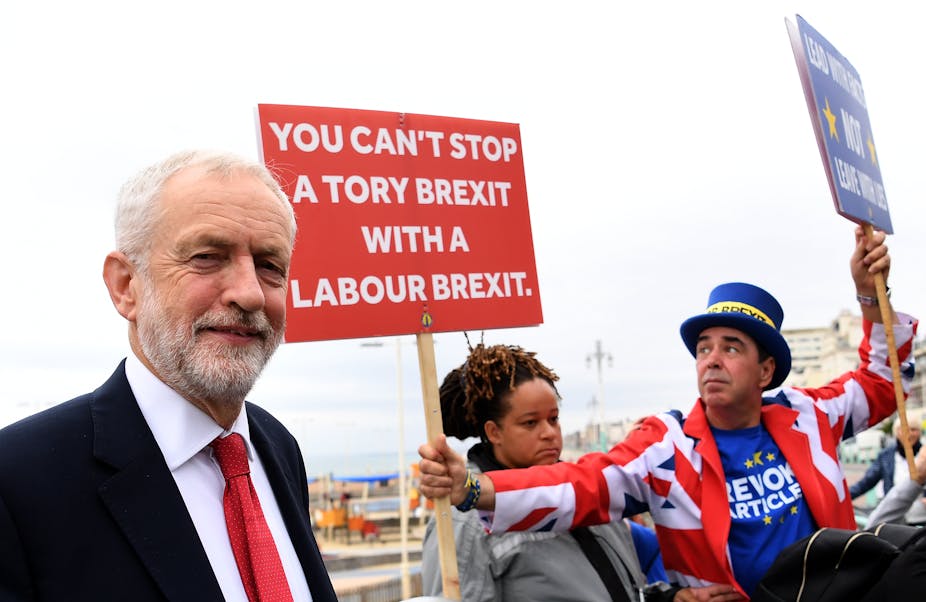The Labour Party is meeting in Brighton for what many assume is a pre-election conference. On the agenda will be attempts to settle on the party’s Brexit policy and the processes it will use to select candidates for parliamentary seats.
Brexit will be a major point of contention, since the party leadership has been rather less keen than the membership to push a clear “Remain” position. It has been possible for Jeremy Corbyn and Labour people, until now, to coalesce around support for “a referendum” to “sort out this mess”. But as the parliamentary turmoil continues, and an election seems probable, Labour’s policy is now under the spotlight like never before. It needs more clarity. What is this referendum for? To provide legitimation for a newly negotiated deal or to provide an opportunity to decide again, in light of the last four years, whether to leave or to remain?
There are problems with both approaches, of course. If there is a lesson from the last four years, it is that referendums can cause incredible disruption. At the moment, Corbyn’s position appears to be that Labour should push on with Brexit negotiations, strike a new deal and then put that deal back to the public in a referendum. There would also be an option on the ballot to remain in the EU.
That has led to the obvious question – what would Labour’s position be in that referendum? Would it support the deal or remaining in the EU? Labour’s members overwhelmingly want to remain in the EU. Corbyn, so far at least, is keeping his options open.
Around 90 constituency Labour parties (CLPs) have put forward conference motions on Brexit, the vast majority of which call on the party to back Remain. While this is fewer than the number of motions submitted for a Green New Deal, with the leadership currently refusing to publicly back remain in all circumstances, Brexit looks set to be the main point of disagreement. During conference negotiations, the CLP motions will be combined to create a single motion to be voted on at conference, so all eyes will be on what this motion looks like.
Pro-Remain activists and MPs want to see the party unequivocally commit to backing Remain in any future referendum, regardless of whether that referendum is about a Corbyn-negotiated Brexit deal. The position of the Liberal Democrats – to revoke Article 50 and remain in the European Union without a referendum – will have raised further concerns among these activists. Corbyn’s stated ambition is to avoid polarising this debate, but is that now even possible? Shadow Brexit Secretary Keir Starmer’s words in interviews, and whether he uses his platform speech to affect all of this, will likely be much discussed.

The precise wording of the conference motion will be important. Will members vote to commit the Labour Party and a Labour government to backing remain in a referendum?
And will Corbyn’s own role be debated? He could, for example, accept that Labour as a party will back Remain, but as prime minister he would stay neutral in the campaign, potentially also keeping a future government’s position neutral. This would be without precedent. Harold Wilson, a figure often mentioned when this topic arises, did not remain neutral in the 1975 referendum. He advocated remaining in the European Community, as it then was.
There is one other scenario to consider. Labour wants a referendum on any deal Boris Johnson brings forward However, while it appears unlikely at this point, if a Johnson deal were to pass parliament next month with no referendum attached, Labour would face a new dilemma: in a post-Brexit election, what would Labour’s policy on membership of the EU be?
An election approaches
That leaves the significant matter of preparing the party for an election. The process of candidate selection has been up in the air, something that will greatly affect the future direction of the party and any agenda it could take into government.
Labour’s sitting MPs who wish to stand again at the next election are currently going through the process of “trigger ballots”. Local branches are voting either to support the sitting MP or trigger a full selection process, meaning they would not automatically be put forward as the candidate in an election. They would have to stand in a contest against others to win the right to stand again.
This process is already generating dismay among Labour MPs, with many concerned that relatively small numbers of people can trigger full contests, even if the MP is supported by the majority of local members. Meanwhile selections for seats without an incumbent have been paused recently, with potential candidates and local members awaiting what kind of role the national party will play.
Conference will also be debating Labour’s agenda for government, should it win this election. Labour’s top team will want to focus on engagement with the party’s manifesto, highlighting some of the more radical economic ideas being put forward. It will also want to return to classic Labour issues such as NHS and education funding.
There will be conversations, too, about whether Labour could emerge as a party short of a majority, but large enough to lead a coalition. What does that mean for Corbyn, particularly given the suggestion that the Liberal Democrats are against forming a government with Labour if Corbyn is to lead it? And, if Labour is defeated at a forthcoming election, what happens next?

